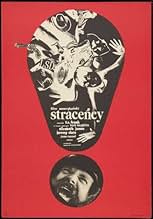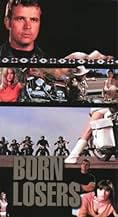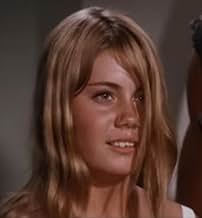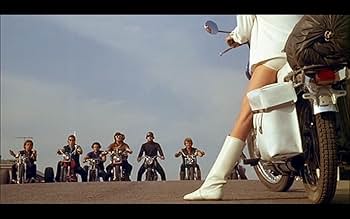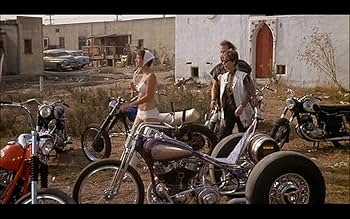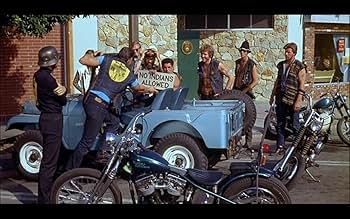VALUTAZIONE IMDb
5,9/10
2966
LA TUA VALUTAZIONE
Aggiungi una trama nella tua linguaBilly Jack battles a motorcycle gang in a small California beach town.Billy Jack battles a motorcycle gang in a small California beach town.Billy Jack battles a motorcycle gang in a small California beach town.
- Regia
- Sceneggiatura
- Star
Robert Tessier
- Cueball
- (as Robert W. Tessier)
Stuart Lancaster
- Sheriff Harvey
- (as Stewart Lancaster)
Recensioni in evidenza
Contrary to one reviewer's information, "Born Losers" was a smash at the box office the FIRST time it was released in '67. And it's easy to see why. It's the most entertaining of the "biker movie" genre, because it has a story and vivid characters. Elizabeth James is Vicky Barrington, a vacationing college student who comes up against a nasty motorcycle gang in a California mountain town. Naturally, the gang, headed by a weathered Jeremy Slate, take off after Vicky (who is on a motorcycle wearing white boots and a matching bikini) and two of them eventually catch and rape her. She's not the only victim. Three incredibly foolish local girls visit the gang's "clubhouse" and meet a similar fate. But they don't have a champion like Tom Laughlin (in his first appearance as Billy Jack) who manages to get Vicky out of danger (at least for a while) and subsequently falls in love with her. "Born Losers" has a great score by "Wild Angels" composer (and future Lieutenant Governor of California) Mike Curb, good acting by a large cast, and a fine cameo appearance by Jane Russell as the trashy mother of one of the victimized girls. Add some beautiful locations and some slick motorcycle stunts, and you have a "Born Winner!" Incidentally, beautiful Ms. James turned up as a police dispatcher in the seventies cult classic, "Dirty Mary Crazy Larry". She also wrote the screenplay for "Born Losers" (under the pen name 'E. James Lloyd').
Given its low budget, this is not a bad movie. A motorcycle gang, led by the scruffy Jeremy Slate, terrorizes a small California town, and in the process rapes several college girls. There's lots of tough talk, motorcycle noise, and violence, as you would expect for a biker film.
Of course, to balance out all the villainous mayhem, you gotta have a hero on the scene. And for the era in which the film was made, there was no better hero than the charismatic loner, half-breed Billy Jack, played with serene gusto by Tom Laughlin. He's a one-man show of moral and physical strength, as he outwits and outfights the biker roughnecks. The film makes the point that bad parenting and ineptness in traditional law enforcement foster an environment conducive to delinquency.
Interestingly, although this is the first Billy Jack film, Laughlin played a similar role ten years earlier, in a movie called "The Delinquents" (1957). His character was Scotty, a good guy teenager who gets mixed up with a bunch of high school hoodlums. Whereas in "The Delinquents" all the villains are kids who drive around in jalopies, in "The Born Losers", the kids have grown into adults who ride motorcycles.
In "The Born Losers" the characters tend to be stereotypes. In a time period that immediately preceded the women's lib movement, the film's female characters are very, very subservient. The film's plot does depend on contrivances to some extent. Dialogue lacks subtext. Production design is ... colorful. And the costumes reek of late 60's garish "hip" (love those pink walls and pink clothes), all perfectly in sync with the Age of Aquarius. Tom Laughlin's direction is excellent. Color cinematography is very good. The outdoor scenery is wonderful, as is the music in the opening title sequence.
I've seen a number of biker films. "The Born Losers" is one of the best. It was highly successful at the box office, and led to later Billy Jack films. It has a cinematic style that is almost iconoclastic; not insignificantly, it preceded "Easy Rider" by a couple of years. Such was the impact of "The Born Losers".
Of course, to balance out all the villainous mayhem, you gotta have a hero on the scene. And for the era in which the film was made, there was no better hero than the charismatic loner, half-breed Billy Jack, played with serene gusto by Tom Laughlin. He's a one-man show of moral and physical strength, as he outwits and outfights the biker roughnecks. The film makes the point that bad parenting and ineptness in traditional law enforcement foster an environment conducive to delinquency.
Interestingly, although this is the first Billy Jack film, Laughlin played a similar role ten years earlier, in a movie called "The Delinquents" (1957). His character was Scotty, a good guy teenager who gets mixed up with a bunch of high school hoodlums. Whereas in "The Delinquents" all the villains are kids who drive around in jalopies, in "The Born Losers", the kids have grown into adults who ride motorcycles.
In "The Born Losers" the characters tend to be stereotypes. In a time period that immediately preceded the women's lib movement, the film's female characters are very, very subservient. The film's plot does depend on contrivances to some extent. Dialogue lacks subtext. Production design is ... colorful. And the costumes reek of late 60's garish "hip" (love those pink walls and pink clothes), all perfectly in sync with the Age of Aquarius. Tom Laughlin's direction is excellent. Color cinematography is very good. The outdoor scenery is wonderful, as is the music in the opening title sequence.
I've seen a number of biker films. "The Born Losers" is one of the best. It was highly successful at the box office, and led to later Billy Jack films. It has a cinematic style that is almost iconoclastic; not insignificantly, it preceded "Easy Rider" by a couple of years. Such was the impact of "The Born Losers".
While most people are familiar with Tom Laughlin's half Native American/half Anglo cult figure Billy Jack through THE LEGEND OF BILLY JACK, many don't know that the character originally appeared in this flick, an off-kilter biker flick about a group of psycho cyclists who terrorize a small California town over Spring Break and zero in on a young college co-ed whom they raped and don't want to testify against them. No, the film isn't as good(or political)as the two sequels, but it does say something about the isolation of the individual in a society that won't stand up and protect that individual from harm. There's a profound sense of solitude in the cinematography of beaches and seaside highways and the sparse, often inarticulate dialog. And, looking closely at the motorcycle gang, you can see some none-too-subtle homosexual overtones. Of course, all the quick cuts and zoom shots earmark the film as a product of late sixties moviemaking. Still, if you want to catch a glimpse of Billy Jack's debut or like to study sixties film styles, take a look at this one
The first "Billy Jack" film is a serious examination of rape and personal cowardice disguised as a biker/drug exploitation film. It manages to satisfy on both counts. No nudity, lots of outrageous clothing, and plenty of nazi bikers. Not quite as good as its sequel (which was written previously) but also not so preachy and talky. Dig the "nature carnage" at the film's beginning. Decent photography (marred in the DVD presentation by pan and scan process), but mid to low grade actors. Russell appears as a burnt-out, harried mom. Is she really acting? She's way over the top, but fun as always.
p.s. (2008, second viewing) p.s. the movie isn't going to appeal to everyone, but it's coming from a good place compared to a lot of exploitation films. There's a lot of classic Hollywood here, Tom Laughlin drawing on a lot of his roots. Like "Billy Jack" this movie is a very passionate statement against rape and it condemns society's attitude about rape. But because the victims are so beautiful, frankly the movie feels more exploitative and less serious than the more successful sequel. You could look on this movie as a learning experience for Laughlin, but it's a very interesting drive-in biker movie in and of itself, very different and more carefully put together than a lot of its brethren. For example this time around I noticed that the film can be seen as an anti-Western -- as opposed to the stereotypical concept of a white man rescuing the white virgins from the "indians", here we have an ostensibly Native American hero rescuing the white women from white bikers (bikes and jeeps standing in for horses and stagecoaches in the traditional Western iconography of course).
p.s. (2008, second viewing) p.s. the movie isn't going to appeal to everyone, but it's coming from a good place compared to a lot of exploitation films. There's a lot of classic Hollywood here, Tom Laughlin drawing on a lot of his roots. Like "Billy Jack" this movie is a very passionate statement against rape and it condemns society's attitude about rape. But because the victims are so beautiful, frankly the movie feels more exploitative and less serious than the more successful sequel. You could look on this movie as a learning experience for Laughlin, but it's a very interesting drive-in biker movie in and of itself, very different and more carefully put together than a lot of its brethren. For example this time around I noticed that the film can be seen as an anti-Western -- as opposed to the stereotypical concept of a white man rescuing the white virgins from the "indians", here we have an ostensibly Native American hero rescuing the white women from white bikers (bikes and jeeps standing in for horses and stagecoaches in the traditional Western iconography of course).
While the acting and plot were weak, this movie is worth watching, if only to educate or remind us of the tumultuous 60s... with the ending of the Vietnam War, Hells Angels, drugs-sex-and-rock-n-roll... in a society where returning Vietnam Vets were considered renegades and loose cannons or just plain crazy... in a society where we screamed peace, while resorting to violence... in a society where women's lib was just beginning to surface in the American Consciousness, with the burning of the bras... in a society where the youth of our country cried out against the "establishment", and we "did our own thing"... where altruism flourished along with the rise in cults, crusading preachers, and activism... in a time when man first walked on the moon... when we, as a society believed... nothing at all could stop us. In all, the movie depicted well the general atmosphere of beliefs and attitudes of the times, that, while they might seem moronic to us in today's world, perhaps, 30 years in the future, our attitudes and beliefs will seem moronic to the generations to follow.
Lo sapevi?
- QuizBased on a real incident in 1964 when members of the Hell's Angels motorcycle gang were arrested for raping five girls in Monterey, California.
- BlooperAt the beginning of the scene at the Shorns' house, the LP record Jodell is looking at while talking to her mother changes from David Rose's 'The Stripper' into 'Music to Strip By' and then back again. These were both actual stripper-themed LPs released in the 1960s (perhaps suggesting Mrs. Shorn's previous occupation?)
- Citazioni
Child: Hey. You don't have a watch on. How you gonna know when fifteen minutes are up?
Billy Jack: Well you better hope that I'm a good guesser, huh?
- ConnessioniFeatured in Dusk to Dawn Drive-In Trash-o-Rama Show Vol. 2 (1996)
- Colonne sonoreBilly Jack's Theme
Written and Produced by Mike Curb
Co-produced by Al Simms
Performed by Davie Allan with The Arrows (as The Sidewalk Sounds)
I più visti
Accedi per valutare e creare un elenco di titoli salvati per ottenere consigli personalizzati
Dettagli
- Data di uscita
- Paese di origine
- Lingua
- Celebre anche come
- Nacidos para perder
- Luoghi delle riprese
- Main Street, Seal Beach, California, Stati Uniti(Biker rally: Irisher [121], Condo's Rock Shop [125], Raines Radio [127], etc.)
- Aziende produttrici
- Vedi altri crediti dell’azienda su IMDbPro
Botteghino
- Budget
- 360.000 USD (previsto)
Contribuisci a questa pagina
Suggerisci una modifica o aggiungi i contenuti mancanti




